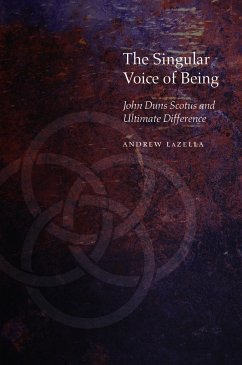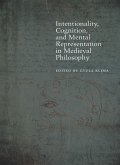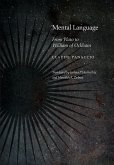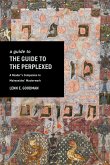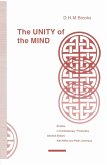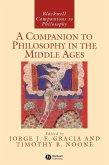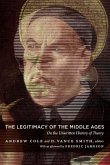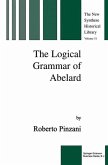Andrew T LazellaJohn Duns Scotus and Ultimate Difference
The Singular Voice of Being
John Duns Scotus and Ultimate Difference
Herausgeber: Klima, Gyula
Andrew T LazellaJohn Duns Scotus and Ultimate Difference
The Singular Voice of Being
John Duns Scotus and Ultimate Difference
Herausgeber: Klima, Gyula
- Gebundenes Buch
- Merkliste
- Auf die Merkliste
- Bewerten Bewerten
- Teilen
- Produkt teilen
- Produkterinnerung
- Produkterinnerung
Reconsiders John Duns Scotus's theory of the univocity of being in connection to his conception of ultimate difference. Develops a systematic account of ultimate difference from disparate discussions throughout his corpus.
Andere Kunden interessierten sich auch für
![Intentionality, Cognition, and Mental Representation in Medieval Philosophy Intentionality, Cognition, and Mental Representation in Medieval Philosophy]() Intentionality, Cognition, and Mental Representation in Medieval Philosophy171,99 €
Intentionality, Cognition, and Mental Representation in Medieval Philosophy171,99 €![Mental Language Mental Language]() Claude PanaccioMental Language96,99 €
Claude PanaccioMental Language96,99 €![A Guide to the Guide to the Perplexed A Guide to the Guide to the Perplexed]() Lenn GoodmanA Guide to the Guide to the Perplexed121,99 €
Lenn GoodmanA Guide to the Guide to the Perplexed121,99 €![The Unity of the Mind The Unity of the Mind]() D H M BrooksThe Unity of the Mind38,99 €
D H M BrooksThe Unity of the Mind38,99 €![A Companion to Philosophy in the Middle Ages A Companion to Philosophy in the Middle Ages]() A Companion to Philosophy in the Middle Ages282,99 €
A Companion to Philosophy in the Middle Ages282,99 €![The Legitimacy of the Middle Ages The Legitimacy of the Middle Ages]() The Legitimacy of the Middle Ages113,99 €
The Legitimacy of the Middle Ages113,99 €![The Logical Grammar of Abelard The Logical Grammar of Abelard]() R. PinzaniThe Logical Grammar of Abelard75,99 €
R. PinzaniThe Logical Grammar of Abelard75,99 €-
-
-
Reconsiders John Duns Scotus's theory of the univocity of being in connection to his conception of ultimate difference. Develops a systematic account of ultimate difference from disparate discussions throughout his corpus.
Hinweis: Dieser Artikel kann nur an eine deutsche Lieferadresse ausgeliefert werden.
Hinweis: Dieser Artikel kann nur an eine deutsche Lieferadresse ausgeliefert werden.
Produktdetails
- Produktdetails
- Verlag: Fordham University Press
- Seitenzahl: 304
- Erscheinungstermin: 7. Mai 2019
- Englisch
- Abmessung: 235mm x 157mm x 22mm
- Gewicht: 636g
- ISBN-13: 9780823284573
- ISBN-10: 0823284573
- Artikelnr.: 53532389
- Herstellerkennzeichnung
- Libri GmbH
- Europaallee 1
- 36244 Bad Hersfeld
- gpsr@libri.de
- Verlag: Fordham University Press
- Seitenzahl: 304
- Erscheinungstermin: 7. Mai 2019
- Englisch
- Abmessung: 235mm x 157mm x 22mm
- Gewicht: 636g
- ISBN-13: 9780823284573
- ISBN-10: 0823284573
- Artikelnr.: 53532389
- Herstellerkennzeichnung
- Libri GmbH
- Europaallee 1
- 36244 Bad Hersfeld
- gpsr@libri.de
Andrew LaZella is Associate Professor of Philosophy at the University of Scranton. He received his PhD from DePaul University in 2010.
List of Abbreviation / ix Introduction: Solomon's Difficulty / 1 Prologue, 1
To Cut Being at Its Joints, 1
The Inadequacy of Thought and Language, 4
Vain Repetition and the Division of Being, 8
On What Follows, 10
On Why It Matters, 13 Part I. Being and Ultimate Difference 1. Being Is Said in Many Ways / 17 Univocity, Equivocity, Analogy, 17
Univocity of Being, 23
Aquinas and Henry on Analogy, 29
Why Univocity?, 33
Thales's Mistake, 38 2. The Real Concept of Being / 41 Real Concepts, 41
Transcendental Quid and Quale, 47
The Double Primacy of Being, 50
How Does Scotus Solve the Problems of Univocity?, 53
Putting the World Back Together Too Soon, 57 3. Ultimate Difference / 61 Ultimate Differences, 62
Extracategorial Difference, 67
Th e Real Basis of Ultimately Differential Concepts, 69
Th e Ground of Primary Diversity, 70
Termination of Quidditative Orders, 86 Part II. Regions of Ultimate Difference 4. The First Cut-The Intrinsic Modes of Being / 93 Intrinsic Modes and the Modal Distinction, 93
The Intrinsic Modes of Being, 95
Transcendental Magnitude, 98
Infinite and Finite Magnitudes, 100
Nonadditive Intensity, 109 5. Ultimate Specific Differences / 120 The Formal Distinction, 120
Ultimate versus Nonultimate Specific Differences, 124
Scotus's Innovation, 131
Real Community Prior to the One and Many, 139
A Dust Cloud of Differences?, 145 6. Haecceitas, or Naked Singularity / 150 What Must Individuation Explain?, 151
Matter as the Principle of Individuation, 153
What Else Is (Not) the Principle of Individuation?, 157
Haecceitas as Ultimate Individual Difference, 165
The Threefold Comparison to Ultimate Specific Differences, 168
Bare Particularity versus Naked Singularity, 177 Conclusion: I Wouldn't Know Him from Adam / 181 The Intelligibility of Singulars, 182
Singular Volitions, 187
Postscript, 191 Acknowledgments / 193 Notes / 195 Bibliography / 249 Index / 263
To Cut Being at Its Joints, 1
The Inadequacy of Thought and Language, 4
Vain Repetition and the Division of Being, 8
On What Follows, 10
On Why It Matters, 13 Part I. Being and Ultimate Difference 1. Being Is Said in Many Ways / 17 Univocity, Equivocity, Analogy, 17
Univocity of Being, 23
Aquinas and Henry on Analogy, 29
Why Univocity?, 33
Thales's Mistake, 38 2. The Real Concept of Being / 41 Real Concepts, 41
Transcendental Quid and Quale, 47
The Double Primacy of Being, 50
How Does Scotus Solve the Problems of Univocity?, 53
Putting the World Back Together Too Soon, 57 3. Ultimate Difference / 61 Ultimate Differences, 62
Extracategorial Difference, 67
Th e Real Basis of Ultimately Differential Concepts, 69
Th e Ground of Primary Diversity, 70
Termination of Quidditative Orders, 86 Part II. Regions of Ultimate Difference 4. The First Cut-The Intrinsic Modes of Being / 93 Intrinsic Modes and the Modal Distinction, 93
The Intrinsic Modes of Being, 95
Transcendental Magnitude, 98
Infinite and Finite Magnitudes, 100
Nonadditive Intensity, 109 5. Ultimate Specific Differences / 120 The Formal Distinction, 120
Ultimate versus Nonultimate Specific Differences, 124
Scotus's Innovation, 131
Real Community Prior to the One and Many, 139
A Dust Cloud of Differences?, 145 6. Haecceitas, or Naked Singularity / 150 What Must Individuation Explain?, 151
Matter as the Principle of Individuation, 153
What Else Is (Not) the Principle of Individuation?, 157
Haecceitas as Ultimate Individual Difference, 165
The Threefold Comparison to Ultimate Specific Differences, 168
Bare Particularity versus Naked Singularity, 177 Conclusion: I Wouldn't Know Him from Adam / 181 The Intelligibility of Singulars, 182
Singular Volitions, 187
Postscript, 191 Acknowledgments / 193 Notes / 195 Bibliography / 249 Index / 263
List of Abbreviation / ix Introduction: Solomon's Difficulty / 1 Prologue, 1
To Cut Being at Its Joints, 1
The Inadequacy of Thought and Language, 4
Vain Repetition and the Division of Being, 8
On What Follows, 10
On Why It Matters, 13 Part I. Being and Ultimate Difference 1. Being Is Said in Many Ways / 17 Univocity, Equivocity, Analogy, 17
Univocity of Being, 23
Aquinas and Henry on Analogy, 29
Why Univocity?, 33
Thales's Mistake, 38 2. The Real Concept of Being / 41 Real Concepts, 41
Transcendental Quid and Quale, 47
The Double Primacy of Being, 50
How Does Scotus Solve the Problems of Univocity?, 53
Putting the World Back Together Too Soon, 57 3. Ultimate Difference / 61 Ultimate Differences, 62
Extracategorial Difference, 67
Th e Real Basis of Ultimately Differential Concepts, 69
Th e Ground of Primary Diversity, 70
Termination of Quidditative Orders, 86 Part II. Regions of Ultimate Difference 4. The First Cut-The Intrinsic Modes of Being / 93 Intrinsic Modes and the Modal Distinction, 93
The Intrinsic Modes of Being, 95
Transcendental Magnitude, 98
Infinite and Finite Magnitudes, 100
Nonadditive Intensity, 109 5. Ultimate Specific Differences / 120 The Formal Distinction, 120
Ultimate versus Nonultimate Specific Differences, 124
Scotus's Innovation, 131
Real Community Prior to the One and Many, 139
A Dust Cloud of Differences?, 145 6. Haecceitas, or Naked Singularity / 150 What Must Individuation Explain?, 151
Matter as the Principle of Individuation, 153
What Else Is (Not) the Principle of Individuation?, 157
Haecceitas as Ultimate Individual Difference, 165
The Threefold Comparison to Ultimate Specific Differences, 168
Bare Particularity versus Naked Singularity, 177 Conclusion: I Wouldn't Know Him from Adam / 181 The Intelligibility of Singulars, 182
Singular Volitions, 187
Postscript, 191 Acknowledgments / 193 Notes / 195 Bibliography / 249 Index / 263
To Cut Being at Its Joints, 1
The Inadequacy of Thought and Language, 4
Vain Repetition and the Division of Being, 8
On What Follows, 10
On Why It Matters, 13 Part I. Being and Ultimate Difference 1. Being Is Said in Many Ways / 17 Univocity, Equivocity, Analogy, 17
Univocity of Being, 23
Aquinas and Henry on Analogy, 29
Why Univocity?, 33
Thales's Mistake, 38 2. The Real Concept of Being / 41 Real Concepts, 41
Transcendental Quid and Quale, 47
The Double Primacy of Being, 50
How Does Scotus Solve the Problems of Univocity?, 53
Putting the World Back Together Too Soon, 57 3. Ultimate Difference / 61 Ultimate Differences, 62
Extracategorial Difference, 67
Th e Real Basis of Ultimately Differential Concepts, 69
Th e Ground of Primary Diversity, 70
Termination of Quidditative Orders, 86 Part II. Regions of Ultimate Difference 4. The First Cut-The Intrinsic Modes of Being / 93 Intrinsic Modes and the Modal Distinction, 93
The Intrinsic Modes of Being, 95
Transcendental Magnitude, 98
Infinite and Finite Magnitudes, 100
Nonadditive Intensity, 109 5. Ultimate Specific Differences / 120 The Formal Distinction, 120
Ultimate versus Nonultimate Specific Differences, 124
Scotus's Innovation, 131
Real Community Prior to the One and Many, 139
A Dust Cloud of Differences?, 145 6. Haecceitas, or Naked Singularity / 150 What Must Individuation Explain?, 151
Matter as the Principle of Individuation, 153
What Else Is (Not) the Principle of Individuation?, 157
Haecceitas as Ultimate Individual Difference, 165
The Threefold Comparison to Ultimate Specific Differences, 168
Bare Particularity versus Naked Singularity, 177 Conclusion: I Wouldn't Know Him from Adam / 181 The Intelligibility of Singulars, 182
Singular Volitions, 187
Postscript, 191 Acknowledgments / 193 Notes / 195 Bibliography / 249 Index / 263

